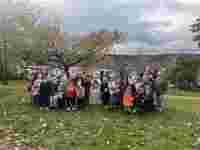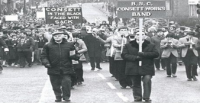"I don't see you as being disabled", said my friend at dinner the other night. The reactions of my other friends at the table were a clue they had said something inappropriate, but they weren't sure what. When we got home that night, they messaged me with a puzzled apology. I'd like to share with you my response.
I'm Proud to be Disabled
I'd like to explain how that kind of comment can feel from the inside.
I AM a disabled woman.
I'm proud of who I've become, both because of and in spite of my disability. I am really, really proud of my career, as well as the fun, independent life I lead.

I know I probably talk too much about my experiences and how I am feeling when I'm with friends who I know will be proud of me too. And that's who you are. I love that you're proud of me and am happy you try to show it.
Saying you don't look disabled implies there's something wrong with being disabled.
I also talk about my experiences because I spent 10 years pretending I didn't have Fibromyalgia, Ehlers-Danlos Syndrome, Endometriosis, or Dyslexia. I made myself sicker by trying to appear 'normal'. But everyone else around me was presenting as not disabled and so I felt I couldn't be disabled and still fit in. I didn't have disabled role models and I was terrified of what it would mean for my life and my career.
"you're lying, attention seeking, a hypochondriac"
When someone says "you don't look disabled" it sounds like they're saying: "you're lying, attention seeking, a hypochondriac". The medical profession did that to me for 20 years before someone took me seriously. They treated individual symptoms, rather than looking at the patterns. They told me it was normal to pass out from the pain of my periods and that I was just clumsy every time I broke a bone or sprained an ankle.
"your pain isn't real, your difficulties at work aren't real, you should just fit in and stop moaning about it".
I have spent 20 years getting up the courage to say to my friends: "sorry I need to adapt our plans so I can do them without making myself sick" and I am still scared every time I say it that they will decide I'm not worth the hassle.

"I see you"
It's a common misconception that saying you don't see colour, or disability, or sexuality, is saying you see the person and don't care about the characteristic in question. But what that person hears is "I don't see you".
Whether it is race, sexuality, gender or anything else, you're not acknowledging something that made them the person you want to be friends with and you're not giving them permission to be themselves with you.
You're also ignoring the negative experiences that are NOT OK rather than actively standing with them and saying you recognise those experiences shouldn't happen and want to help make them stop.

My friends make me feel seen.
I still love my friend
Thank you for being my wonderful, brave friend who makes me feel loved and who is honest and sweet enough to apologise when you're wrong. I hope this message hasn't hurt your feelings and if you ever want to ask me questions about anything I will always be honest and open and willing to listen as well as explain.
I love you. Really looking forward to seeing you again soon. Xxx

It's not just me...
A 2022 survey by BUPA showed that 68% of people with less visible disabilities have been told "you don't look disabled".
British Paralympian Kadeena Cox, who sometimes uses a wheelchair, was recently interviewed by BBC news, explaining how people often question whether she is really disabled.
When my mum sent me the article, it really hit a chord. I could empathise with her about people's reluctance to give up a priority seat on a train and while we don't share the same condition, like Kadeena I live with pain, brain fog, sensory issues and the unthinking, kindly-meant insensitivity of the people around me.
For more lived experience from people with invisible disabilities, as well as those with other protected characteristics or some form of difference, please do check out NHS Digital's Uncomfortable Conversations videos!
This invisible disabilities week, please ask questions, have compassion and, most of all, see us.

#invisibledisabilitiesweek 16-22 October 2022. Check out www.invisibledisabilitiesweek.org #fibromyalgia #ehlersdanlossyndrome #endometriosis #dyslexia #neurodiversity #youdontlookdisabled

Youth Social Action / November 25th, 2024
Benfieldside Community Garden / November 25th, 2024
Benfieldside Community Garden's First Birthday
What a year we have had! We have transformed a derelict space into a fabulous community asset. Plus there's even more to come. Take a look at our fabulous booklet to get a full appreciation of all of the work we have done!

Consett Heritage Project / August 29th, 2024
Consett's Broken Heart
'Consett's Broken Heart' is a poem created by Olivia, Alfie A, Alfie R, Daisie, Jaxon and Damien, of Moorside Primary School. This is a fabulous poem inspired by the impact the closing of the steelworks had on the town of Consett.

Aspirations and Future Planning / December 11th, 2023
Skills for a Fast Changing World- with the Cranfield Trust and their Patron HRH Princess Anne
What an amazing opportunity and experience! As an extension of the success of our project with the Cranfield Trust, Christine Thomas our CEO attended their event at the Freemason's Hall, Great Queen Street in London on the 6th December 2023, with their Patron HRH Princess Anne.